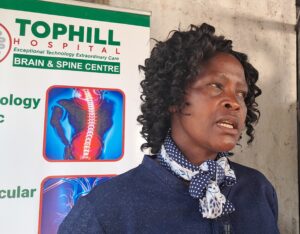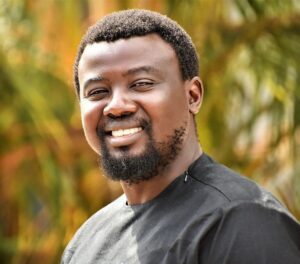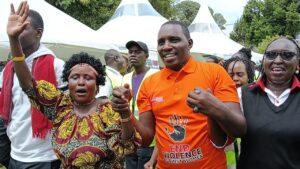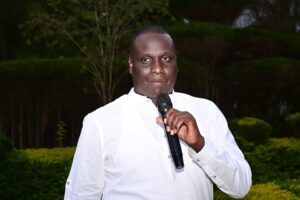Ezekiel Odhiambo Narrates How he Suffered back Pains For Seven Years

Ezekiel Odhiambo had been feeling some pain on his back for close to seven years now. Occasionally he sought treatment from several hospitals while at home in Mbita, Homabay County where he hails from, and in Iten, Elgeyo Marakwet County where he works.
During this period, he used painkillers to relieve himself from the pain but the condition reoccurred affecting him at his workplace.
“I started feeling unwell sometimes back but I didn’t know what the problem was. I sometimes felt numb around my waist and thighs and would have problems walking. I went to hospital severally and was given painkillers but didn’t know that it was a serious condition until a few days ago,” he explains.
Between September and October, Odhiambo went for paramilitary training for a whole month and went to his Mfangano Island home immediately after the training.
It was during his stay at home that he felt excruciating pain on his waist along the lower spine. The pain was too much and in mid-November, he reported to work at Iten.

“The pain continued when I used to struggle to go to work. On November 22 he sought treatment at the Iten Referral Hospital where an x-ray was done on the affected area. However, the imaging did not show clearly what was wrong.
“My waist was very painful and my right leg could not move. The pain was so much that I was crying. I was referred to a hospital here in Eldoret that after checking my medical cover could not admit me. A friend suggested Tophill Hospital where I came to find what I really wanted,” he explains further.
The doctor requested him to undergo an MRI which was done within a very short period of time. After the results, the doctor recommended surgery.
“I had stayed for close to four hours in great pain but immediately after the MRI the pain was managed and I was prepared for the surgery. The personnel I found at the hospital were very helpful and encouraging. Despite being alone without any family members, I was offered great services within a short time,” Odhiambo notes.


Dr. Florentius Koech, a neurosurgeon at Tophill Hospital who attended to Odhiambo encouraged and reassured him before the surgery.
According to Dr F Koech, Odhiambo had an emergency neurological condition called Cauda Equina Syndrome.
“The head of the spinal cord forms a phylum of nerve roots that are exposed without anything to protect them from damage. When these naked nerve roots are exposed to damage, they get injured easily. In case of an injury, the case should be treated as an emergency because they rarely recover when exposed to severe injury in this case we had a disc that had migrated from where it should be into the canal thus compressing the nerve roots,” Dr. Koech explains.
The doctor with a team at the theatre had to open the spinal cord and remove the disc fragment that was compressing the nerve roots and replaced the two torn discs with new ones. They finally reconstructed his spine to ensure it went back to its normal form.
“It’s a long process that took us 3 hours. Luckily Odhiambo responded very well and there is hope that he is not going to be paralyzed. Currently, he has been able to move his leg and can walk with support for some time before he can go back to his normal self,” Dr. Koech discloses.
After the surgery, Odhiambo was moved to the ICU where he responded quickly and within 12 hours, he was moved to the ward.
“I was taken care of properly at the ICU by a nurse I met until my wife came. The nurse, whom I came to know is called Naomi, I realized has a calling. She helped me to turn and I was impressed by the conscience she had for the other patients too,” Odhiambo says
Odhiambo is grateful that he has been able to roll, sit and make some steps and that the pain on the waist is gone. He is currently nursing the surgery wound as he recuperates in the ward.
He also thinks his condition was caused by an injury while he was playing soccer back in school.
“I used to play football. I remember there were several instances where I fell down awkwardly on my back however I didn’t know it had such effects on me,”
His wife,Eunice Adhiambo Anyango says that her husband had been complaining for close to eight years.
“He used to have a motorbike when he used to work back at home and would complain of pain like he had a sprain. He used to manage the pain until in October after attending paramilitary training when he came home and I realized he was walking awkwardly. He was in pain,” she explains.
She further explains how her husband called her in tears on a Tuesday morning complaining of so much pain, something that worried her knowing well she was far away.
She was more worried when he told her that he was scheduled for surgery and no family member was around to tend to him.
“He assured me that he was in good hands and that I should not worry. I want to thank the doctor and everyone who helped him because when I came in he was even able to smile. I also saw him move with the help of the physiotherapy team and I am hopeful that in three days he will be discharged.
Dr. F Koech cautions that any person with Cauda Equina Syndrome should be taken to the hospital immediately to avoid paralysis. He says that delayed surgery does not guarantee recovery.
Symptoms of the condition include bowel dysfunction causing a patient to retain or be unable to hold urine, and loss of sensation on the thighs, around the buttocks, and the back of legs and heels otherwise known as saddle anesthesia. The condition progresses to weakening of the limbs and complete paralysis if not treated in time.
He says the most common causes of Cauda Equina Syndrome include trauma, disc herniation, infections like tuberculosis, and tumors.






